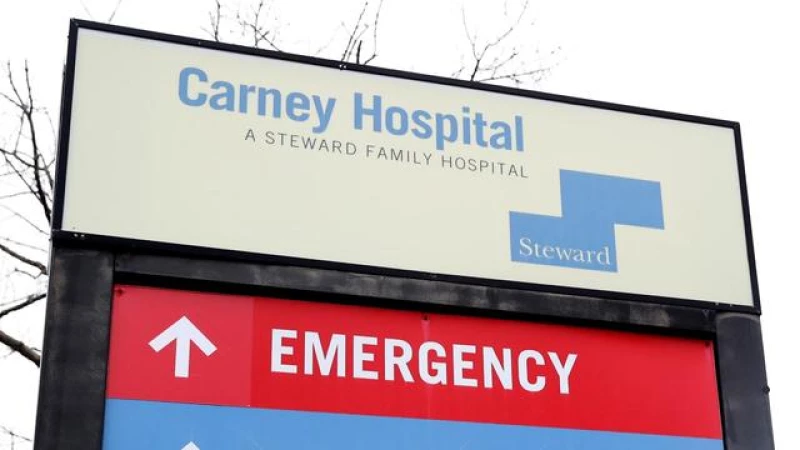BOSTON – Steward Health Care, the struggling health care provider that relied on backing from private equity investors to quickly acquire dozens of community hospitals, including facilities in Massachusetts, Texas and Florida, announced Monday that it is filing for bankruptcy.
Steward, which is millions of dollars in debt, said it has "commenced an in-court restructuring process through the filing of voluntary petitions for relief" under Chapter 11 of the U.S. Bankruptcy Code. It submitted the filing in the Southern District of Texas.
The Dallas-based company currently owns 30 hospitals across eight states, including nine in Massachusetts, where its smoldering financial crisis has raised concerns about patient safety.
Steward has been one focus of a year-and-a-half-long investigation revealing how private equity investors have siphoned hundreds of millions of dollars from community hospitals with devastating public health consequences. Records showed Steward hospitals around the country with a trail of unpaid bills, at times risking a shortage of potentially lifesaving supplies.
Last year, it was found that Steward redirected money away from hospital operations by selling off the real estate of San Antonio's Texas Vista Medical Center before closing the facility altogether.
The organization's insolvency filing reveals a list of 30 creditors to whom a sum exceeding $500 million is owed. Among these creditors is the U.S. government, with a debt of over $32 million in reimbursements for insurance overpayments.
Analysts indicate that the debts of Steward are likely even greater, potentially leading to one of the most significant hospital bankruptcies in U.S. history once all is said and done. In a released statement, the organization expressed its dependence on its landlord, Medical Properties Trust, to supply adequate funding that would enable its hospitals to remain operational during the bankruptcy process.
"The Company is finalizing the terms of debtor-in-possession financing from Medical Properties Trust for initial funding of $75 million and up to an additional $225 million upon the satisfaction of certain conditions acceptable to Medical Properties Trust," Steward stated.
No disruptions in day-to-day operations, assures Steward Health Care
The organization mentioned that filing for bankruptcy allows them to "continue to provide necessary care to its patients in their communities without disruption."
Both Steward and Massachusetts officials have affirmed that they do not anticipate any interruptions in daily operations.
"Steward hospitals are still operational, and individuals should not delay in seeking medical attention," stated Massachusetts Health and Human Services Secretary Kate Walsh, further mentioning that the state "is collaborating with Steward and potential partners to facilitate a smooth transition of ownership that safeguards access to care, preserves jobs, and stabilizes our healthcare system."
Amid assurances of putting patients first, concerns loom over the future of the company's hospitals, especially in Massachusetts. Health care workers have been expressing worry for months about the potential impact of hospital closures.
The Massachusetts Nurses Association stated, "The potential loss of any of these facilities will have devastating consequences for hundreds of thousands of residents from the South Shore to southern New Hampshire." The association sees Steward's reorganization as a chance for stakeholders to prioritize caregivers and patients.
Private equity's influence on health care
Steward's spokesperson previously mentioned that the company's executives prioritize patients above all else and have invested significantly in their hospital system, especially in Massachusetts, where they took over struggling hospitals on the brink of closure.
Despite these claims, Steward has become a symbol of the risks associated with private equity investments in the health care sector. The company began acquiring hospitals in Massachusetts in 2010, with substantial financial backing from private equity firm Cerberus.
Cerberus divested its stake in Steward by January 2021, exiting with an $800 million profit over the course of a decade. Financial records indicate that Steward has also offloaded more than $1 billion worth of its hospitals' real estate since 2016 to Medical Properties Trust, a company specializing in acquiring hospital properties from private equity investors.
An SEC filing from 2021 revealed that Steward's owners took home millions in dividends. Concurrently, Steward's CEO Ralph de la Torre purchased a 190-foot yacht, valued at approximately $40 million. When contacted by CBS News, Steward verified de la Torre's ownership of the yacht.
"Steward Health Care has made every effort to navigate successfully in a challenging healthcare landscape," de la Torre stated in the company's press release issued at 3:30 a.m. on Monday. "Initiating Chapter 11 restructuring is deemed to be in the best interests of our patients, physicians, employees, and communities at this juncture."







